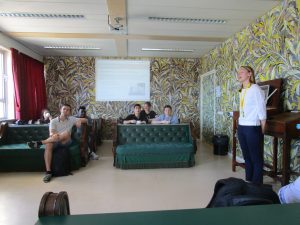Thursday was an incredibly busy day of the Dutch part of the sustainability journey! It involved waking up to have breakfast at the StayOkay hostel very early so that we could leave at 6:45. We took the train through the rustic Dutch countryside to the Ministry of Environment and Infrastructure in The Hague in order to meet one of the most famous speakers of our entire trip: Henk Ovink. He is the first Special Envoy for International Water Affairs in the Netherlands and probably the most important figure in the world when it comes to international water management. In the aftermath of Hurricane Sandy, he was appointed by the US Secretary of the Interior Sean Donovan to direct the Rebuild by Design project in New York and New Jersey. The fact that the New York Times ran a front-page story on Dutch responses to sea level rise, which prominently featured Henk, on the very same day of our visit made us all the more appreciative.
Our meeting at 8:00 am began with Henk providing some background on Dutch water sustainability before plunging into his own work and Dutch interactions with other nations on preventing disasters and preparing for sea level rise. His powerful presence was clear throughout his speech and he captured our attention while enlightening us about the Dutch way of treating water and why it was so successful. “In the Netherlands,” he said, “Water is culture.” He focused on the way the Dutch combine safety and quality of design in projects like Room for the River. Every safety problem is regarded as an opportunity to innovate and improve quality of life. If you’re going to build and invest, why not win public approval by improving people’s lives, adding value, and promoting small businesses at the same time. In the Netherlands, sustainability goes hand in hand with entrepreneurship–“opportunity” is the watchword–and community. Throughout his speech, Henk offered insights on collaboration between nations and differing mentalities on disaster prevention. As he scurried off for an appointment with the Minister, he asked if we’d like some books. An assistant brought us multiple copies of two books, one on the history and variety of dikes in the Netherlands, and another on the Rebuild by Design project in NYC and New Jersey, where we were delighted to find the names of Penn profs who had been involved.
We took a bus back to the center of The Hague and enjoyed an hour of sight-seeing and shopping. Jay and Paul bought matching bomber jackets.
Soon after, we met Peter van Wingerden, the director of Beladon, a Rotterdam-based design group that specializes in innovative and sustainable buildings and landscapes on the water. Not near the water, but on it! Their floating dairy farm, part of a larger floating farms project, is now under construction in Rotterdam. He spoke at length about the struggles and benefits of creating floating farms without subsidies, both in the Netherlands and China. He talked about his upcoming floating farm’s dairy production, use of biomass, and relations to the agricultural industry. Many questions followed his presentation, especially after he mentioned a *top secret* project involving aeroponics, a revolutionary plant-growing method, among other innovations. We ended with a discussion on the financial viability of floating farms while Ayrton expressed concerns about whether floating urban agriculture could harm the agriculture industry as a whole. As a group, we had a passionate and extended discussion about this topic.
We were then given the opportunity to have lunch in The Hague before meeting again at Prodemos for a tour of the Dutch Parliament. We sat in the old Dutch senate seats and received a lecture on the Dutch political system. The tour guide then took us into the thirteenth-century Dutch Ridderzaal (Hall of Knights), where the King reads the throne speech on the day parliament opens, a speech outlining the government’s plans for that year.
Next, she showed us the new parliament building and we witnessed a live Dutch parliamentary debate regarding the promotion of diversity in the national police force. The debate became heated as groups from numerous political parties had vastly different viewpoints. The concepts seemed to get progressively more liberal throughout the debate, starting with Geert Wilders’ nationalist and xenophobic Party for Freedom and ending with Denk, the young, progressive Dutch-Muslim party.
Finally, the group ended the day by relaxing at the beach in Scheveningen and heading back to the hostel in Rotterdam at night. The day was long, but very rewarding. Tomorrow, we travel to Delft for a more cultural and less political Dutch sustainability experience.
Mark









